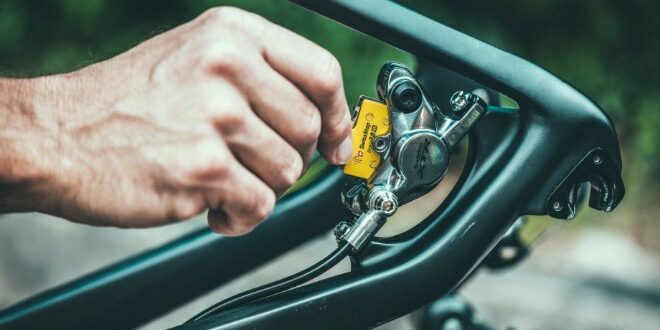This month, BikeBiz catches up with Christian Heule, international sales at SwissStop, to find out more about a brand celebrating its 85th anniversary
Can you give us a little background on Swiss Stop?
The parent company of SwissStop, REX Articoli Tecnici, was founded in 1935 by the Favini family. Its 100-strong workforce is mainly known for producing rubber-based technical products. Until 1991, the factory supplied Weinmann around 20 million brake-pads a year, but after Weinmann’s bankruptcy, a quarter of a century of brake experience couldn’t just be forgotten. This led to the creation of the SwissStop brand to keep producing what we believe to be the worlds best brake pads to both the OEM market, and to shops all around the world.
Although our history is firmly rooted in rim brake pads, we’ve also been driven to create a range of disc pads and rotors for mountain bikes and the rapidly growing array of disc-equipped road, gravel, and cross bikes. We are an OEM partner to a number of brands such as DT Swiss, SRAM, FFWD and Mavic, and although this reinforces the link between our pads and top-tier products, we believe all riders at every level can massively benefit from swapping their existing brake setup to SwissStop.
On top of producing products for road that we are probably most known for, we have recently added new products such as a 203mm centre lock rotor to improve compatibility across the MTB market. This pairs excellently with our EXOTherm pads, performing exceptionally at dispelling heat building up at the calliper leading to reduced performance.
What makes SwissStop unique? What does it offer that its competitors perhaps do not?
We try to fulfil the highest performance requirements for any customer. Braking systems have been improving rapidly, especially with the wider adoption of disc brakes in the road market, but these stock brakes are not without fault. There are still some aspects that we believed could be improved. We aim to keep our pads both rim/rotor friendly whilst still maintaining strong braking performance and ensuring longevity for the pad and braking surface.
Another large complaint of stock setups is brake noise, especially in wet or winter conditions. Our RS disc pads have silent performance (providing the recommended bedding -in procedure has been followed) which makes them ideal for the UK market where conditions are often wetter and cooler.
All our brake pads are produced in our factory in Mendrisio, Switzerland. The salary costs here are so high here that raw material costs are relatively low in the whole manufacturing process. This unique opportunity means we are able to use the very best raw materials available without having to make a sacrifice on material quality. The latest road disc pads use a closely guarded secret composition of abrasive elements, aramid fibres, copper and dehydrated natural resins.
Although it doesn’t have an influence on the final product, we also try and work alongside our local community which we believe is part of our responsibility as a business. For this reason, most of our product packaging is done in two sheltered workshops that support disabled people in employment in our local area.
What innovations in the industry are exciting you at the moment?
There is obvious potential in the growing disc market which is going to be both challenging and exciting. I feel there are a lot of misconceptions about disc brakes on road and gravel bikes and it’s going to be a challenge on trying to change these. For example, I’m running 160mm rotors front and back on my road setup as I see larger rotors offering noticeable increases in performance for negligible weight gain, and even improved wear rate on the pads. With more riders turning to gravel as well, the benefits of stronger and more responsive brakes far outweigh any aesthetic or weight penalties and I suspect we’ll see more and more bikes coming with larger rotors in the near future.
The increase in adoption of e-bikes across MTB, road and leisure has also brought with it additional challenges that we are looking at addressing. The massive increase in total system weight puts a huge additional strain on a braking setup, which can lead to premature pad and rotor wear as well as increasing the risk of brake fade.
Our Disc E pads have much higher endurance characteristics and high-temperature functionality, even when compared with our previous Sintered Disc S pads which make them better suited for E-Bikes. I suspect we’ll see more E-Bike specific products in the marketplace which will make for some exciting developments in technology; we’ll likely see these trickle down to standard cycling products too.
What are your plans for 2020 and beyond?
We were lucky in the fact that our factory only had to close for a very short time due to the coronavirus. We’ve seen some countries with strict lockdowns, whereas others have had huge surges in people riding more, so we’re very lucky in that it had minimal impact on production. Also, with us being based in Switzerland, we’re still able to quickly ship product where it’s needed and have faced fewer challenges in logistics than the far East.
I think we definitely can, and will grow in the Disc market but still believe we can occupy some additional market share in the rim brake market. Although disc brakes become more popular on road/CX/gravel bikes, users of rim brakes still expect and need higher performance pads, and that’s something we’re keen to keep working on and improving.
 BikeBiz Bicycle and cycling retail news
BikeBiz Bicycle and cycling retail news




